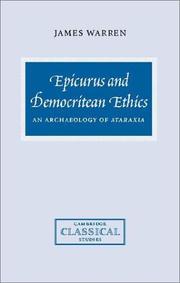| Listing 1 - 10 of 65 | << page >> |
Sort by
|
Book
ISBN: 9780521695305 9780521873475 0521695309 0521873479 Year: 2009 Volume: *5 Publisher: Cambridge Cambridge university press
Abstract | Keywords | Export | Availability | Bookmark
 Loading...
Loading...Choose an application
- Reference Manager
- EndNote
- RefWorks (Direct export to RefWorks)
This Companion presents both an introduction to the history of the ancient philosophical school of Epicureanism and also a critical account of the major areas of its philosophical interest. Chapters span the school's history from the early Hellenistic Garden to the Roman Empire and its later reception in the Early Modern period, introducing the reader to the Epicureans' contributions in physics, metaphysics, epistemology, psychology, ethics and politics. The international team of contributors includes scholars who have produced innovative and original research in various areas of Epicurean thought and they have produced essays which are accessible and of interest to philosophers, classicists, and anyone concerned with the diversity and preoccupations of Epicurean philosophy and the current state of academic research in this field. The volume emphasises the interrelation of the different areas of the Epicureans' philosophical interests while also drawing attention to points of interpretative difficulty and controversy.
History of philosophy --- History of ancient Greece --- Epicureans (Greek philosophy) --- Epicuriens --- Épicurisme --- Epicureans (Greek philosophy). --- Philosophy, Ancient --- Épicurisme.
Book
ISBN: 9781844650927 9781844650910 1844650928 184465091X Year: 2007 Publisher: Stocksfield Acumen
Abstract | Keywords | Export | Availability | Bookmark
 Loading...
Loading...Choose an application
- Reference Manager
- EndNote
- RefWorks (Direct export to RefWorks)
History of philosophy --- Antiquity --- Pre-Socratic philosophers.

ISBN: 0521813697 9780521813693 Year: 2002 Volume: *52 Publisher: Cambridge Cambridge University press
Abstract | Keywords | Export | Availability | Bookmark
 Loading...
Loading...Choose an application
- Reference Manager
- EndNote
- RefWorks (Direct export to RefWorks)
Ancient ethics --- Antieke ethiek --- Ethics [Ancient ] --- Ethiek [Antieke ] --- Ethiek van de Oudheid --- Ethique de l'Antiquité --- Ethics, Ancient --- Morale ancienne --- Epicurus --- Democritus, --- Ethics, Ancient. --- Democritus --- -Epicurus --- -Epikuros --- Ėpikur --- Epiḳoros --- Epicuro --- Epikouros --- Abīqūr --- Yibijiulu --- Epicure --- Epʻikʻurosŭ --- Έπίκουρος --- Ethics --- -Ethics --- Epikuros --- Democrit, --- Démocrite, --- Democrito, --- Demokrit, --- Dēmokritos, --- Demokryt, --- Demokʻŭritʻosŭ, --- Dīmūqrīṭis, --- Temokʻŭritʻosŭ, --- Δημόκριτος, --- Ethics. --- Ἐπίκουρος
Book
ISBN: 9781107025448 1107025443 1316190730 9781316190739 9781139178976 9781107631595 1316188876 1316211053 1316209199 1316205525 1316203697 1316201821 1316207331 1139178970 1107631599 9781316203699 9781316188873 9781316211052 9781316209196 9781316205525 9781316201824 9781316207338 Year: 2014 Publisher: Cambridge
Abstract | Keywords | Export | Availability | Bookmark
 Loading...
Loading...Choose an application
- Reference Manager
- EndNote
- RefWorks (Direct export to RefWorks)
Human lives are full of pleasures and pains. And humans are creatures that are able to think: to learn, understand, remember and recall, plan and anticipate. Ancient philosophers were interested in both of these facts and, what is more, were interested in how these two facts are related to one another. There appear to be, after all, pleasures and pains associated with learning and inquiring, recollecting and anticipating. We enjoy finding something out. We are pained to discover that a belief we hold is false. We can think back and enjoy or be upset by recalling past events. And we can plan for and enjoy imagining pleasures yet to come. This book is about what Plato, Aristotle, the Epicureans and the Cyrenaics had to say about these relationships between pleasure and reason.
Epicureans (Greek philosophy). --- Pleasure. --- Reason. --- Learning. --- Epicuriens --- Plaisir --- Raison --- Apprentissage --- Plato. --- Aristotle. --- Reason --- Epicureans (Greek philosophy) --- Pleasure --- Épicurisme --- Plaisir (morale) --- Aristote, --- Platon, --- Critique et interprétation --- Aristote --- Critique et interprétation. --- Learning process --- Comprehension --- Education --- Mind --- Intellect --- Rationalism --- Emotions --- Ethics --- Senses and sensation --- Utilitarianism --- Happiness --- Hedonism --- Philosophy, Ancient --- Aristoteles --- Aristotle --- Aristotile --- Plato --- Platon --- Platone --- Platoon --- Épicurisme. --- Raison. --- Vernunft. --- Aristoteles, --- Plato, --- Arisṭāṭṭil --- Aristo, --- Aristotel --- Aristotele --- Aristóteles, --- Aristòtil --- Arisṭū --- Arisṭūṭālīs --- Arisutoteresu --- Arystoteles --- Ya-li-shih-to-te --- Ya-li-ssu-to-te --- Yalishiduode --- Yalisiduode --- Ἀριστοτέλης --- Αριστοτέλης --- Аристотел --- ארסטו --- אריםטו --- אריסטו --- אריסטוטלס --- אריסטוטלוס --- אריסטוטליס --- أرسطاطاليس --- أرسططاليس --- أرسطو --- أرسطوطالس --- أرسطوطاليس --- ابن رشد --- اريسطو --- Pseudo Aristotele --- Pseudo-Aristotle --- アリストテレス --- Aflāṭūn --- Aplaton --- Bolatu --- Platonas --- Po-la-tʻu --- Pʻŭllatʻo --- Pʻŭllatʻon --- Pʻuratʻon --- Πλάτων --- אפלטון --- פלאטא --- פלאטאן --- פלאטו --- أفلاطون --- 柏拉圖 --- 플라톤 --- Платон --- プラトン

ISBN: 9780520253674 0520253671 9780520253698 0520253698 Year: 2007 Publisher: Berkeley University of California press
Abstract | Keywords | Export | Availability | Bookmark
 Loading...
Loading...Choose an application
- Reference Manager
- EndNote
- RefWorks (Direct export to RefWorks)
Pre-Socratic philosophers. --- Présocratiques --- Présocratiques --- Pre-Socratic philosophers --- Pre-Socratics --- Presocratic philosophers --- Presocratics --- Philosophers

ISBN: 0199252890 9780199252893 019929769X 9780199297696 0191601403 9786611989934 1281989932 0191531006 Year: 2004 Publisher: Oxford Clarendon
Abstract | Keywords | Export | Availability | Bookmark
 Loading...
Loading...Choose an application
- Reference Manager
- EndNote
- RefWorks (Direct export to RefWorks)
(Publisher-supplied data) The ancient philosophical school of Epicureanism tried to argue that death is "nothing to us." Were they right? James Warren provides a comprehensive study and articulation of the interlocking arguments against the fear of death found not only in the writings of Epicurus himself, but also in Lucretius' poem De rerum natura and in Philodemus' work De morte. These arguments are central to the Epicurean project of providing ataraxia (freedom from anxiety) and therefore central to an understanding of Epicureanism as a whole. They also offer significant resources for modern discussions of the value of death--one which stands at the intersection of metaphysics and ethics.
Death. --- Epicureans (Greek philosophy) --- Epicurus. --- Epicurean philosphers --- Epicureanism --- Epicureeërs (Griekse filosofie) --- Epicuriens (Philosophie grecque) --- Epicurisme --- Epikureismus --- Philosophes épicuriens --- Philosophie épicurienne --- École épicurienne --- Épicurisme --- Épicurisme (Philosophie grecque) --- Épicuréisme --- Mort --- Epicuriens --- Death --- Philosophy, Ancient --- Dying --- End of life --- Life --- Terminal care --- Terminally ill --- Thanatology --- Philosophy --- Epicurus --- Ἐπίκουρος --- Epikouros --- Epikuros --- Ėpikur --- Epiḳoros --- Epicuro --- Abīqūr --- Yibijiulu --- Epicure --- Epʻikʻurosŭ --- Attitude to Death. --- Philosophy. --- Epicureans (Greek philosophy). --- Doodsangst. --- Epicurisme. --- Klassieke oudheid. --- Mort. --- Épicuriens. --- Tod. --- Philosophie. --- Epikureer. --- Epicurismo. --- Filosofia grega. --- Épicure. --- Epicuro.
Book
ISBN: 1139801562 1139002570 9781139002578 9780521873475 9780521695305 Year: 2009 Publisher: Cambridge Cambridge University Press
Abstract | Keywords | Export | Availability | Bookmark
 Loading...
Loading...Choose an application
- Reference Manager
- EndNote
- RefWorks (Direct export to RefWorks)
This Companion presents both an introduction to the history of the ancient philosophical school of Epicureanism and also a critical account of the major areas of its philosophical interest. Chapters span the school's history from the early Hellenistic Garden to the Roman Empire and its later reception in the Early Modern period, introducing the reader to the Epicureans' contributions in physics, metaphysics, epistemology, psychology, ethics and politics. The international team of contributors includes scholars who have produced innovative and original research in various areas of Epicurean thought and they have produced essays which are accessible and of interest to philosophers, classicists, and anyone concerned with the diversity and preoccupations of Epicurean philosophy and the state of academic research in this field. The volume emphasises the interrelation of the different areas of the Epicureans' philosophical interests while also drawing attention to points of interpretative difficulty and controversy.
Epicureans (Greek philosophy) --- philosophy --- history --- Greece
Book
ISBN: 9780980296549 0980296544 Year: 2008 Publisher: Crawley, W.A. : UWA Press,
Abstract | Keywords | Export | Availability | Bookmark
 Loading...
Loading...Choose an application
- Reference Manager
- EndNote
- RefWorks (Direct export to RefWorks)
Pirates --- Piracy --- Prostitutes --- Chinese --- Ethnohistory --- Pirates --- Piraterie --- Prostituées --- Chinois à l'étranger --- Ethnohistoire --- Social conditions. --- Conditions sociales --- Southeast Asia --- Asie du Sud-Est --- History. --- Histoire

ISBN: 1317493362 1317493370 1315711915 1282943391 9786612943393 1844653919 9781844653911 9781317493372 9781317493365 9781315711911 9781282943391 6612943394 9781844650910 9781844650927 184465091X 1844650928 0520253671 9780520253674 0520253698 9780520253698 Year: 2007 Publisher: Durham : Acumen Publishing,
Abstract | Keywords | Export | Availability | Bookmark
 Loading...
Loading...Choose an application
- Reference Manager
- EndNote
- RefWorks (Direct export to RefWorks)
The earliest phase of philosophy in Europe saw the beginnings of cosmology and rational theology, metaphysics, epistemology, and ethical and political theory. It saw the development of a wide range of radical and challenging ideas: from Thales claim that magnets have souls and Parmenides account that there is only one unchanging existent to the development of an atomist theory of the physical world. This general account of the Presocratics introduces the major Greek philosophical thinkers from the sixth to the middle of the fifth century BC. It explores how we might go about reconstructing their views and understanding the motivation and context for their work as well as highlighting the ongoing philosophical interest of their often surprising claims. Separate chapters are devoted to each of the major Presocratic thinkers, including Xenophanes, Heraclitus, Parmenides, Anaxagoras, Empedocles, Leucippus and Democritus, and an introductory chapter sets the scene by describing their intellectual world and the tradition through which their philosophy has been transmitted and interpreted. With a useful chronology and guide to further reading the book is an ideal introduction for the student and general reader.
Digital
ISBN: 9781139178976 Year: 2014 Publisher: Cambridge Cambridge University Press
Abstract | Keywords | Export | Availability | Bookmark
 Loading...
Loading...Choose an application
- Reference Manager
- EndNote
- RefWorks (Direct export to RefWorks)
| Listing 1 - 10 of 65 | << page >> |
Sort by
|

 Search
Search Feedback
Feedback About UniCat
About UniCat  Help
Help News
News